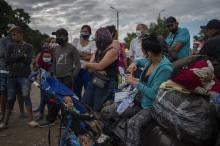PAHO/WHO Collaborating Centres: celebrating the achievement of our common goals
WHO Collaborating Centres (CCs) are typically parts of institutions such as universities, hospitals, research institutes, academies or ministries that have been designated by the WHO Director-General to carry out activities in support of the Organization's programs by providing information, services, and expertise; thereby strengthening their own national capacity for training, research, and collaboration for health development.
















